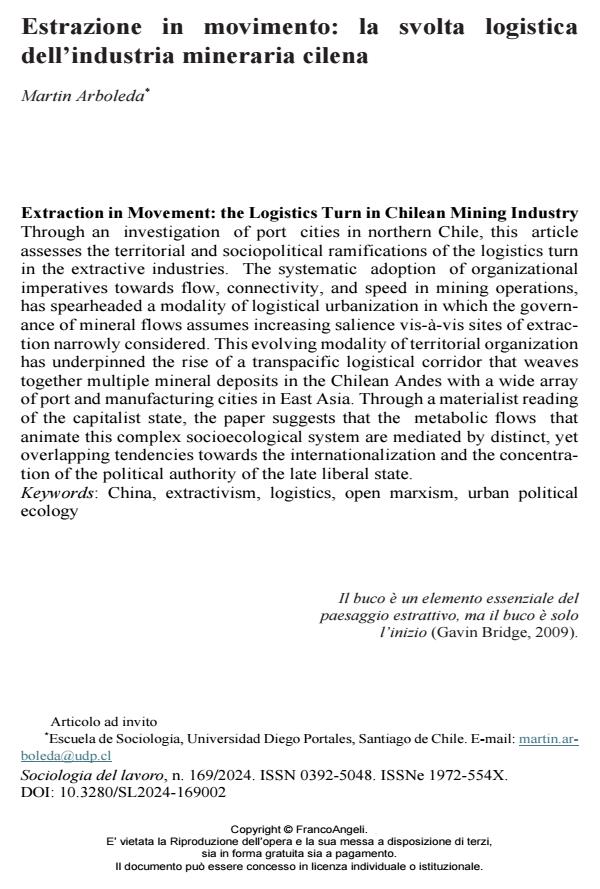Estrazione in movimento: la svolta logistica dell’industria mineraria cilena
Titolo Rivista SOCIOLOGIA DEL LAVORO
Autori/Curatori Martin Arboleda
Anno di pubblicazione 2024 Fascicolo 2024/169
Lingua Italiano Numero pagine 28 P. 24-51 Dimensione file 258 KB
DOI 10.3280/SL2024-169002
Il DOI è il codice a barre della proprietà intellettuale: per saperne di più
clicca qui
Qui sotto puoi vedere in anteprima la prima pagina di questo articolo.
Se questo articolo ti interessa, lo puoi acquistare (e scaricare in formato pdf) seguendo le facili indicazioni per acquistare il download credit. Acquista Download Credits per scaricare questo Articolo in formato PDF

FrancoAngeli è membro della Publishers International Linking Association, Inc (PILA), associazione indipendente e non profit per facilitare (attraverso i servizi tecnologici implementati da CrossRef.org) l’accesso degli studiosi ai contenuti digitali nelle pubblicazioni professionali e scientifiche.
Basandosi sul caso delle città portuali del Cile settentrionale, questo articolo analizza le implicazioni territoriali e sociopolitiche dello spostamento logistico nelle industrie estrattive. L'adozione di imperativi di flusso, velocità e connettività da parte dell'industria mineraria su larga scala ha dato origine a una modalità di organizzazione urbano-territoriale in cui la governance del movimento dei minerali assume un ruolo sempre più rilevante rispetto agli spazi di estrazione considerati singolarmente. Questo processo di urbanizzazione logistica ha reso possibile lo sviluppo di un corridoio infrastrutturale trans-pacifico che collega i molteplici giacimenti minerari degli altopiani cileni con le città manifatturiere e portuali dell'Asia orientale. Attraverso una lettura materialista dello Stato, si sostiene che i flussi metabolici di questo complesso sistema socio-ecologico sono mediati dalle tendenze simultanee e contrastanti all'internazionalizzazione e alla concentrazione dell'autorità politica dello Stato tardo liberale.
Parole chiave:Cina, ecologia politica urbana, estrattivismo, logistica, marxismo aperto
Martin Arboleda, Estrazione in movimento: la svolta logistica dell’industria mineraria cilena in "SOCIOLOGIA DEL LAVORO " 169/2024, pp 24-51, DOI: 10.3280/SL2024-169002